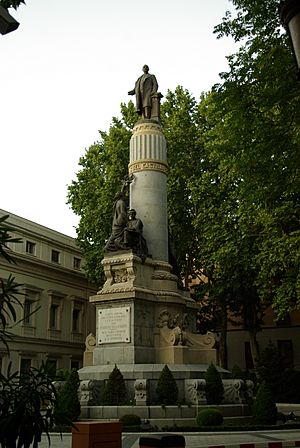Monument to Cánovas del Castillo facts for kids
| Monumento a Cánovas del Castillo | |
 |
|
| Coordinates | 40°25′15″N 3°42′42″W / 40.420942°N 3.711528°W |
|---|---|
| Location | Plaza de la Marina Española, Madrid, Spain |
| Designer | Pedestal: José Grases Riera Statues: Joaquín Bilbao |
| Opening date | 1 January 1901 |
| Dedicated to | Antonio Cánovas del Castillo |
The Monument to Cánovas del Castillo is a famous statue in Madrid, Spain. It honors Antonio Cánovas del Castillo, an important Spanish politician. The monument has a bronze statue of Cánovas del Castillo. This statue was created by Joaquín Bilbao. It stands on top of a large base, or pedestal, designed by José Grases Riera. The pedestal also features other sculptures by Bilbao.
History of the Monument
This monument was built using money collected from many people. This is called a "popular subscription." It means people donated small amounts to help pay for it. The monument is located in a public square called Plaza de la Marina Española. This square is right next to the Palace of the Senate, which is where Spain's government meets.
What the Monument Looks Like
The monument has several interesting parts. It starts with a round base at the bottom. Above this base, there's a section with 12 decorated panels. These panels have designs of plants. There are also strong supports, called buttresses, at the top of this section.
In the middle part of the monument, you can see two bronze groups of statues.
- On the front, there is a seated statue named History. She is writing important events from Cánovas's life in a book.
- Next to History is a standing statue called Glory. She leans on History and holds a laurel wreath. A laurel wreath is a symbol of victory and honor. She places it near Cánovas's name, which is carved into the column.
- On the back of the monument, there is a bronze display. It shows a lion, the Spanish coat of arms, and a flag.
The tall column then rises up. At the very top of this column is the main statue of Cánovas del Castillo. He is shown as if he is giving a speech. His right arm is reaching forward, and his left hand rests on a book.
The monument was officially opened on January 1, 1901.
See also

 | Sharif Bey |
 | Hale Woodruff |
 | Richmond Barthé |
 | Purvis Young |

